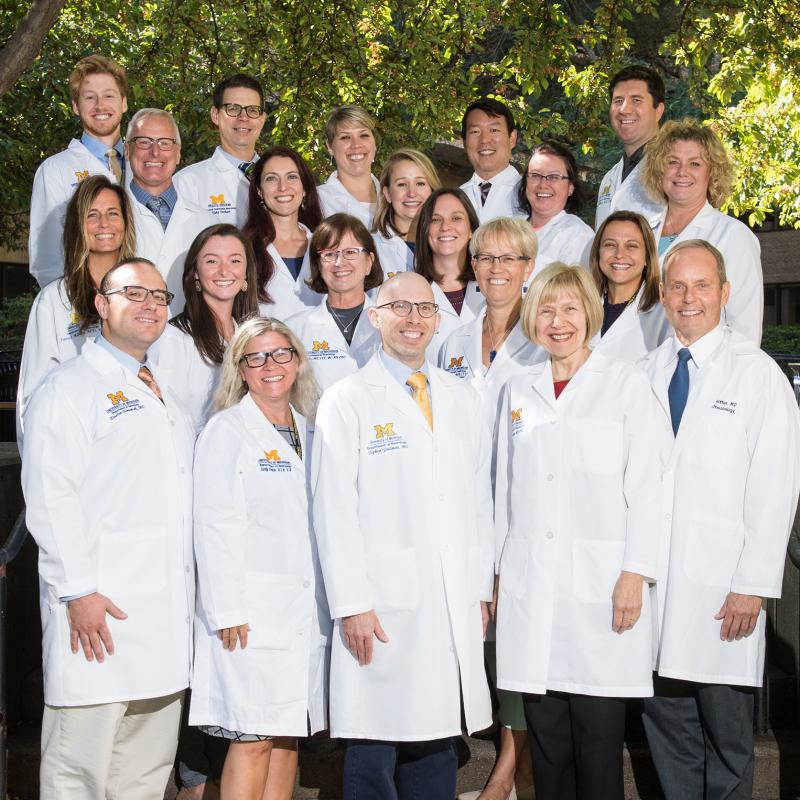The Multidisciplinary ALS Clinic at Michigan Medicine has undergone a rapid, yet successful transformation in the last month to continue elite care for its patients amid the COVID-19 pandemic that has swept through southeast Michigan. ALS patient visits are taking place via Michigan Medicine’s Virtual Care Program to allow patients and their caregivers to remain in the safety of their own homes. ALS Clinic Director Stephen Goutman, M.D., M.S., and his team are very pleased with the early returns of online video patient care.

“Our team, led by Nurse and Clinical Care Coordinator Sandy Lemkin, has done an amazing job of quickly pivoting to uphold our standard of care for patients,” says Dr. Goutman. “As soon as it became necessary to move visits entirely online, we were in contact with patients to explain the new system and walk them through how it would work. Given that persons with ALS are in higher risk categories if they are exposed to COVID, this transition is extremely important to both provide the necessary and important clinical evaluations while keeping our patients safe from community exposure to COVID. Also, since we do not know how long this pandemic will last, we feel it is important for all patients to keep their visits so that we can continue to provide critical help, assistance, and management. We are finding that there is a lot more that we can do through a video screen than we would have imagined; I’ve even enlisted the help of family members to help perform the neurological examination!”
Proper use of technology has proven to be a critical piece in communicating with patients at home. Patients primarily use the MyUofMHealth patient portal on their mobile device or computer with a digital camera. Many patients have adapted well to the online visits, thanks to their familiarity with the MyUofMHealth portal. Other secure video-conferencing platforms, like BlueJeans, have been also been employed to accommodate what works best for each patient.
“We frequently use the patient portal to communicate with patients,” says Lemkin. “Though we see patients in the clinic every few months, they are accustomed to interacting with me or Dr. Goutman through the portal for any quick questions and most other needs. For this move to online visits we needed to train some patients and caregivers on the video elements of the portal, but overall it’s been working well. Each week we find a new way to simplify the process.”
Important elements of an in-person patient visit can be replicated online. After Dr. Goutman “visits” a patient virtually, other clinicians join the video call, including the physiatrist, pulmonologist, occupational therapist, physical therapist, dietitian and social worker. Individuals participating in clinical trials also meet with a research nurse. After each Wednesday virtual clinic, the team convenes to discuss how they can improve the online care.
The clinic staff has coordinated with ALS of Michigan and the ALS Association to order adaptive equipment for patients. Michigan Medicine’s rehabilitation group has modified its care by recommending over-the-counter equipment that can be shipped directly to the patient’s home.
“There is a learning curve but we are certainly working to continue the personal relationships we have with our patients and their caregivers through this new medium,” says Dr. Goutman. “Some of the truly hands-on care cannot be performed virtually, but we are focusing our effort on the main issues via video.”
In the months ahead, in-person care is expected to become the norm again at the ALS Clinic. However, improving the functionality of the overall Virtual Care Program is among Michigan Medicine’s initiatives in the years to come. Meeting patients where they live and when it’s convenient for them is part of the organization’s goal of providing better patient-centered care. Virtual visits provide terrific flexibility to ALS patients from all over the state of Michigan who may have difficulty traveling to Ann Arbor.
“I think Virtual Care is providing a great opportunity for our clinic to better serve the ALS community and that’s ultimately what we are here to do,” says Dr. Goutman. “Historically, many of our patients are burdened by travel limitations. We’ve already received feedback this past month that many patients appreciated staying in the comfort of their home and avoiding a two- or three-hour drive to the clinic. We are looking forward to seeing our patients again in person, but the experience that we are gaining during this pandemic will also help us serve our patients that can no longer easily travel to clinic.”
For questions about the Multidisciplinary ALS Clinic at Michigan Medicine, please call 734-936-9010.
